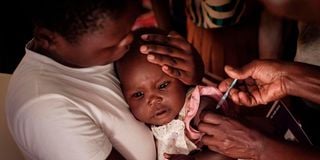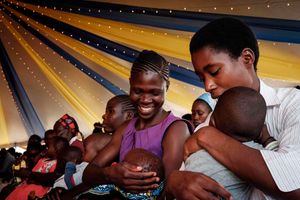18 million doses of vaccine a shot in the arm for malaria war

A child receives a shot during the launch of the extension of the world’s first malaria vaccine (RTS, S)
What you need to know:
- Since 2019, Kenya, Ghana and Malawi have been delivering the vaccine through the Malaria Vaccine Implementation Programme.
- The programme has already administered the RTS,S/AS01 vaccine to more than 1.7 million children in the three countries.
Kenya is among 12 African countries set to receive 18 million doses of the first-ever malaria vaccine over the next two years, the global vaccine alliance (Gavi) has announced.
The allocation of the vaccines is based on the framework for allocation of limited malaria vaccine supply, which prioritises areas with the highest need and where the risk of malaria illness and death among children is greatest.
Since 2019, Kenya, Ghana and Malawi have been delivering the vaccine through the Malaria Vaccine Implementation Programme.
Coordinated by the World Health Organization (WHO) and funded by Gavi, the Global Fund to Fight AIDS, Tuberculosis and Malaria, and Unitaid, the programme has already administered the RTS,S/AS01 vaccine to more than 1.7 million children in the three countries. The vaccine has proven to be safe and effective, leading to a significant reduction in severe malaria cases and child deaths.
Notably, 28 African countries have expressed interest in receiving the vaccine. Apart from Kenya, Ghana and Malawi, the initial allocation of 18 million doses will enable nine additional countries — Benin, Burkina Faso, Burundi, Cameroon, Democratic Republic of the Congo, Liberia, Niger, Sierra Leone and Uganda — to introduce the vaccine into their routine immunisation programmes for the first time.
The vaccine doses will be supplied to Gavi via Unicef, with the first doses expected to arrive in countries by the last quarter of 2023 and the roll-out commencing in early 2024.
Thabani Maphosa, managing director of Country Programmes Delivery at Gavi, expressed optimism about the potential impact of the vaccine: “This vaccine has the potential to be very impactful in the fight against malaria and when broadly deployed alongside other interventions, it can prevent tens of thousands of future deaths every year.”
However, he emphasised the need for effective utilisation of the available doses and the importance of applying the lessons learned from the pilot programmes.
Malaria remains one of Africa’s deadliest diseases, claiming the lives of nearly half a million children under the age of five each year. The continent accounted for approximately 95 per cent of global malaria cases and 96 per cent of deaths in 2021 according to WHO.
The roll-out of the vaccine brings hope for reducing the high mortality rate among children in Africa, according to Unicef Associate Director of Immunisation Ephrem T Lemango. “For a long time, these deaths have been preventable and treatable, but the roll-out of this vaccine will give children, especially in Africa, an even better chance at surviving.”





